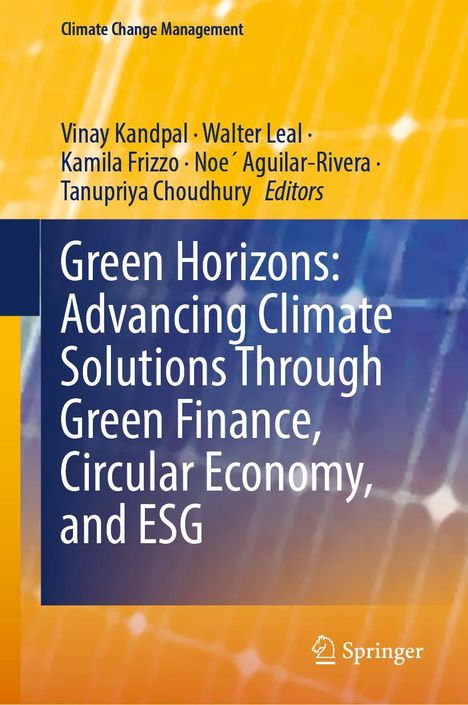Green Horizons: Advancing Climate Solutions Through Green Finance, Circular Economy, and ESG, Gebunden
Green Horizons: Advancing Climate Solutions Through Green Finance, Circular Economy, and ESG
(soweit verfügbar beim Lieferanten)
- Herausgeber:
- Vinay Kandpal, Walter Leal Filho, Kamila Frizzo, Noe´ Aguilar-Rivera, Tanupriya Choudhury
- Verlag:
- Springer, 01/2026
- Einband:
- Gebunden
- Sprache:
- Englisch
- ISBN-13:
- 9783032034830
- Artikelnummer:
- 12363712
- Umfang:
- 700 Seiten
- Gewicht:
- 1201 g
- Maße:
- 241 x 160 mm
- Stärke:
- 43 mm
- Erscheinungstermin:
- 17.1.2026
- Hinweis
-
Achtung: Artikel ist nicht in deutscher Sprache!
Klappentext
This book aims to explore the intersection of green finance, circular economy principles, and ESG strategies. This multifaceted approach is essential for fostering sustainable development and addressing climate change challenges. Green finance is the term used to describe various forms of finance (green bonds, loans, etc.) that are designed to finance green projects (Shukla et al., 2024). It helps to attract investments in sustainability, especially renewable energy and sustainable infrastructure (Manoharan et al., 2024). `The idea of greenium, or the price investors are prepared to pay for green assets, matters to market behavior (Karimov, 2024).
The circular economy, in turn, supports resource efficiencies and waste minimization and incorporates ESG metrics to develop ecologically benign industrial environments (Malevskaia-Malevich, 2024; Ramakrishna & Brindha, 2024). Companies can be more sustainable and reduce manufacturing costs using circular economy strategies to create greater market value. ESG models help organizations integrate sustainability into their business model by emphasizing transparency and accountability (Ramakrishna & Brindha, 2024). ESG policies can reduce climate risk and drive long-term value, making them a key consideration for investors and stakeholders (Manoharan et al., 2024). Despite the potential of green finance, challenges such as market allocation of resources and varying ESG application levels persist (Ding, 2024).
The foundations of climate action, green finance, circular economy, and ESG---all these have greenwashing and a dysfunctional regulatory regime obstructing them. Acceptance of these challenges will be what keeps sustainability initiatives viable and sustainable. The climate emergency demands new, integrated sustainable development goals (SDGs). While the focus on green finance and ESG is critical, it is also important to consider the potential for greenwashing, where companies may misrepresent their sustainability efforts. This highlights the need for rigorous standards and accountability in the implementation of these strategies.

